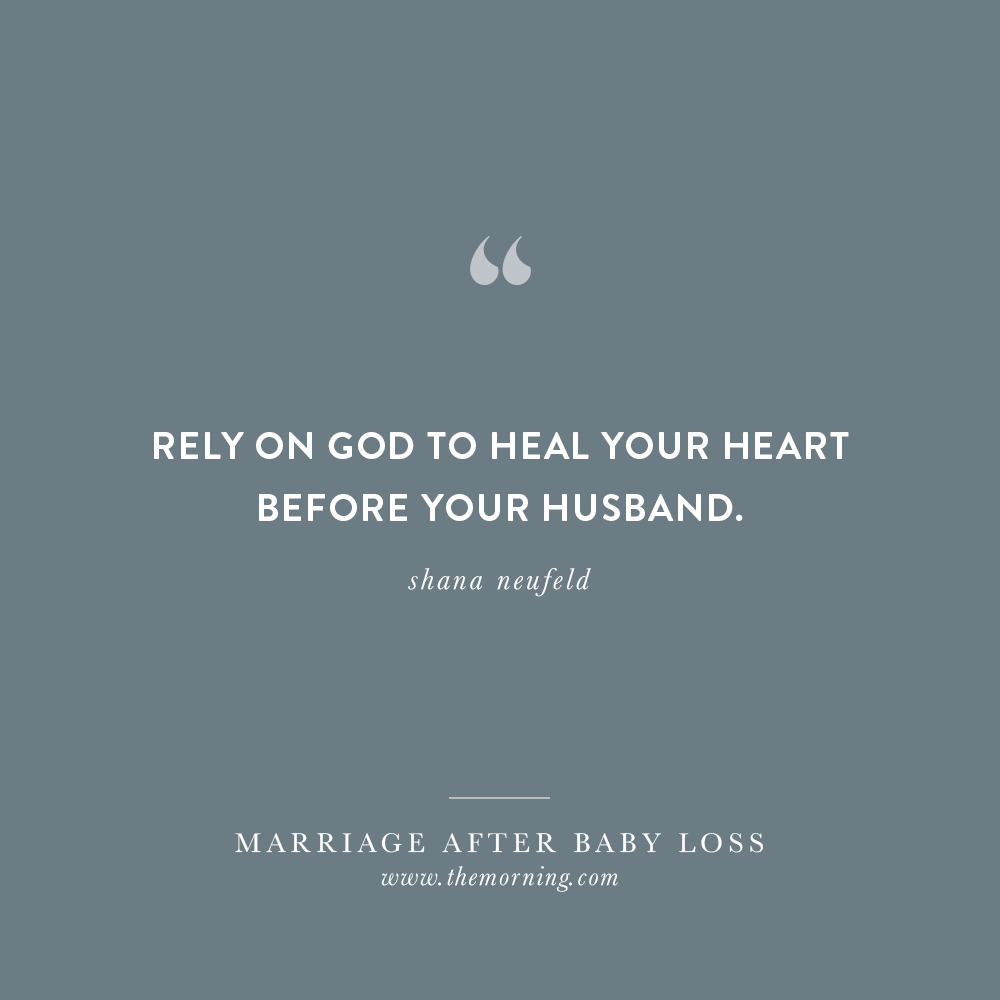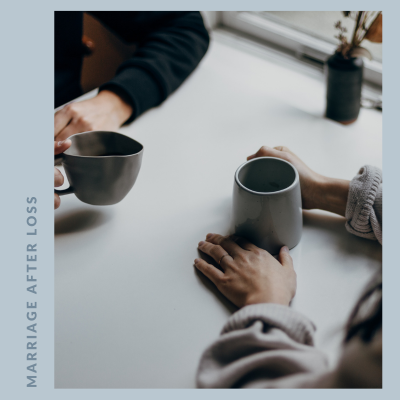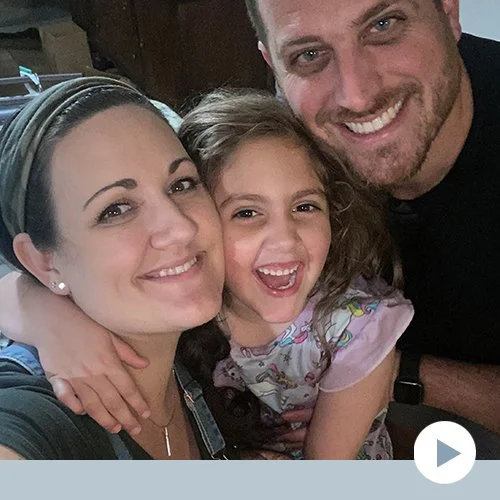55 Women Share Their Best Advice for Marriage After Baby Loss
Tara: Until you live through it, it’s really hard to understand how your spouse can grieve the loss of a child so differently than you. You lost the same child and it feels like you should feel and grieve the same way but you most certainly will not. And that’s ok.
Ansley: Your spouse will grieve differently than you, but it doesn’t mean they aren’t affected. You can be honest about your feelings while still being gentle with theirs. You each need to find support separately as well. Moms need other moms who have been through it and understand the pain. Dads need the same. Men and women process so differently, and sometimes we need others who can be in our grief with us in a way that’s mutually understood. It doesn’t mean your spouse doesn’t want to talk with you. But a man will never know the physical pain of the loss, and mom will never see her husband go through physically losing a child and FEELING as if their body failed them. You both need people who will get you, right where you are.
Michelle: Be kind to one another. You may get sad at different times and about different things. Give each other space but also be supportive.
Emily: GRACE. Give one another grace for how you each are responding to your loss, how you are navigating through it, and how it will change you for the rest of your lives.
Hannah: Be very open and honest with each other about how you’re feeling, good days/bad days. You’re in it together and you have to communicate.
Denisa: Don’t try to talk each other out of feelings. Don’t try to change each other’s mind.
Jennifer: Everyone grieves differently.
Lori: Find ways to grieve together but also grieve separately....my husband and I have both been reading spiritual books and psalms...
Allison: Don’t take it out on them. It’s so easy to get mad at those closest to us but do your best to stick together through those moments.
Bee: Be gentle with each other. My partner and I process things so differently - I'm very raw and emotional, and he is very compartmental and private with his grief, and that's okay. I've had to learn not to pry or be upset if he doesn't share with me, and he's had to adapt a lot to me needing comfort a lot.
Amy: Be very clear about how you want to spend special days. Or what “special days” are. My husband had no idea that I would be emotionally on my daughter’s due date. He thought I’d be okay on Mother’s Day because we have a son at home with us. So I learned quickly that I had to communicate what I needed (need)those days....
Caitlyn: Honesty is best. It’s ok that you each deal with grief differently, and learn to accept that early. And it’s necessary to make time to be with each other in whatever way that looks like for your relationship.
Kristyn: Remember to remind yourself during those times when you might feel upset because they are not grieving the same as you, that everyone grieves differently, but it doesn’t mean the grief isn’t there.
Samantha: Just have grace with each other on the hard days. You will grieve differently on different days, try not to take it personally if your spouse isn't patient or lashes out at you...even if it seems to not be grief related. It probably is!
Bethany: Things like this can make or break a marriage. I knew my husband wasn’t sharing all of his hurt with me, because he was trying to be strong. He finally admitted there were days it was hard for him, but when I was having a good day he didn’t want to bring it up. I worked hard to dispel this on his and my part. I don’t think we ever do our relationships a service by trying to protect the other from emotion that so involves us both. And, I had to remember this happened to him too. It wasn’t just my battle to fight. I, too, encouraged him to talk to someone else besides me. And now he has made himself available to men who have experienced the same.
Also, I think a huge thing for us was taking a trip alone. Our 3 losses happened after our first child. When we finally got away-from the house, from the distractions, we felt so much emotion. It was actually kind of hard. But it was needed and I think it really helped us connect in a different and needed way than we had been able to.
Jennifer: Communicate about your feelings and remember it’s ok to not be ok.
Katelyn: It’s ok to not process what you’ve been through the same way. We had so many moments where I was mad at my husband for not being “as hurt and upset” as I was.... but how could he experience our loss the same EXACT way? It was actually a gift that he didn’t process his grief the same way because he was what I needed at my lowest points.
Jamie: While you will grieve differently individually, you will also grieve for each other and that too will look different. It was so hard for my husband to watch me bear the physical burden of our miscarriages... something he wanted so badly to take from me; for me I had a hard time knowing my body played a part in his emotional pain. It’s all so complex and constantly evolving. Give each other grace and be kind to yourselves too.
Casey: Find a counselor together. Navigate the process with someone who can guide you individually but also as a unit.
I’d also like to add checking on the fathers. Just don’t forget they experienced loss also.
Becky: Since you are both grieving a devastating loss, you don't always have the capacity to be each other's support system. Yes, communicate and connect with your spouse, but reach out to other supportive people outside this inner circle. This advice probably saved my marriage.
Joree: Give each other space to grieve differently. But still do it together. We were the most successful when we spoke what we were feeling in the moment. Something about our feelings being heard and validated by another person helped us go through the grief instead of trying to move around it. Doing it together meant that we grew closer to each other because of our grief and it didn’t form a wedge between us.
Elena: Go away together on a totally unplugged trip and just be.
Rachel: Be so gentle with one another. Be quick to forgive when either of you inevitably snaps at the other.
One simple thing that works well for my husband and me is when one of us is low, the other will ask, “I’m with you, buddy. Would you like some space or do you want me near?”
Melissa: That it is ok to grieve and mourn, that it allows us to heal. When my pastor told us that almost 6 years ago it really helped me. It’s like he gave us permission that I didn’t feel like I had because miscarriages are almost hush hush. It’s a real loss, it’s real pain and it’s ok to feel that and give yourself some grace if you don’t bounce back in one week or month, or longer. healing takes time. Be gentle with each other, laugh with each other and it will help so much!
Jacqueline: We just leaned into one another, we couldn’t let each other go, we stood side by side, we cried side by side, we cuddled every night and cried ourselves to sleep. We held hands more than we have ever held hands before. We had to have copious amounts of grace. Grace for when the one is having a very low day, grace for when one is moving slower than the other grace for when one is in a random bad mood.
Mollie: Keep communicating with one another ESPECIALLY in the dark moments.
Michaela: Communicate, communicate, communicate. Recognize that you will probably grieve differently. Allow each other to feel what you need to. Know that it’s a difficult journey but not an impossible one. Look after yourself.
it’s a difficult journey but not an impossible one.
Karen: When we first heard, during the pregnancy, that our daughter had a life limiting condition, my husband cried and so I saw his pain and was aware of it throughout. After other bereavements it's not been so obvious. I dreaded his mum dying as they were so close but after she died he seemed ok. But I began to notice that everything he did ( everything!) he was accompanying with a verbal noise! He'd come down the stairs ( "boom boom boom boom boom"), he'd put a coffee down beside me ("bop") etc etc and at the point when it really began to irritate me, the penny dropped and I realised, "ah! it's grief!" So - I'd add to all the above by saying 1. each bereavement affects us in different ways - don't assume your partner will respond the same way each time 2. If he/she really starts to annoy you in a time of bereavement, that's possibly because that's the only way they are currently able to express their hurt and pain. Keep loving them.
Melissa: That even in the midst of grief manifesting differently between the two of you, to continuously choose each other and show up for each other. I remember feeling so hurt that he wasn't 'as sad' as I was; until the day came when I was feeling okay and he was devastated. He carried me when I needed him to, and I was able to carry him when the time finally came for him to be carried.
Also, talk things out. Regroup. Find out where each of you are at and how to best navigate through that together. Voice frustrations, voice the little things (you'll both have them) and choose to walk them out together!
Kara: See a grief therapist together. We found an amazing one and it saved us after the loss of our 4-month-old son. Also, tune in to love languages. I’m not completely familiar with the whole concept , but I definitely know that my husband needed intimacy to feel connected. It was hard for me to understand it at the time, but our therapist explained it to me and it became so clear.
Heidi: Seeing a grief therapist together meant we had a designated time to process our grief with a neutral person each week, not that we didn’t discuss our grief otherwise, but it was a helpful check in as we experienced grief so differently. I also saw a therapist on my own.
Also getting away after the funeral was so, so helpful.
Shana: Seek God together. Understand you both grieve differently and be respectful of that. Keep an open line of communication, especially when you feel crazy for what you’re feeling. But most importantly, rely on God to heal your heart before your husband.
But most importantly, rely on God to heal your heart before your husband.
Amy: Each of you will handle it differently. Just keep the lines of communication open and respect each other’s differences with how they handle grief.
Sarah: Communicate! We lost our first and might lose our next baby and it can either break you apart or bring you so much closer. You decide which one by talking to each other about your feelings toward the situation.
Joan: Find as much support as possible and PLEASE don’t take it personally that you both grieve differently. The first year after our daughter’s death was so hard. We grieved her so differently and it caused so many problems because we each had expectations. We sought help and learned so much.
We still grieve differently but it’s ok. We both suffered a devastating loss.
Nicole: It took me a long time (and working with a therapist) to understand that my husband would not grieve the same way that I would. I'm a verbal processor, and I kept expecting him to need to talk about the experience like I was. But he is more of an introspective processor who doesn't always share his thoughts. Keeping the dialogue open about our baby, and being able to cry freely with each other when we needed to, was all part of the healing process for us.
Evelyn: You will both grieve differently and that’s ok. Communicate with each other and be patient.
Tawny: When things get especially tough, remember to to turn TOWARD each other and not ON each other. It’s so easy for your sadness to turn into anger and frustration and it can sometimes be taken out in your spouse. That piece of advice really helped to recognize my negative emotions and where they were being placed.
Kelsey: Everyone grieves differently and on different timelines. Communication and openness is key. Be gentle with yourself and each other.
Amy: Have a support system. Maybe one or two people that understand and someone that can allow you to share your journey even through the pain.
Erin: I learned not to place unrealistic expectations on my husband. Like so many have said, men and women grieve differently, that’s okay. But to add to that, it’s also not our spouses job to bring healing, comfort, and peace to our life after loss (though they can to some degree). We can’t put expectations that they will be able to provide us with those things on them. Those things come from God.
it’s also not our spouse’s job to bring healing, comfort, and peace to our life after loss.
Yuri: 1 Corinthians 13, love each other in the grieving process.
Bree: Give each other grace, everyone grieves differently! Also, reach out for help! We saw a marriage counselor not for a reactive purpose but for proactive purpose and it was so helpful!
Shereen: Give each other space to grieve at their own pace. What works for one person may not work for the other.
Kate: Find some small ways to connect each day. Intentionally doing things like these really helped us: hold hands more, hug longer, play the We’re Not Really Strangers game, pray together, walk/sit outside, read to each other, watch a funny show/movie, volunteer, etc.. just adding in a few things we didn’t normally do.
Rachel: Be aware of your expectations and share them with your spouse. And ask them their expectations too.
Maggie: Grief may make you feel weird things. When I was grieving my second miscarriage I started having all these feelings that somehow there must be something wrong with us that this kept happening. Like we must not be right together or something. It was a very unsettling thought considering I love my husband and our marriage more than anything!! Grief tries to find an explanation for things and so it’s normal to have crazy thoughts like that sometimes but just know that those feelings pass and you will find a way through the grief together.
Kimberly: Remember that everyone grieves differently, and that there are big differences between women and men! And, there’s no right or wrong way to grieve!
Cassie: Express your feelings and communicate even when it’s hard to get them out.
From a GRIEVING Husband:
Ben: As the husband, it’s ok to be hurting too. It will make your spouse feel alone in the grief if you keep the hurt to yourself. You will grieve differently than her and that’s ok but she will need to know that you are grieving with her.
MORE RESOURCES FOR marriage after loss
THE JOYFUL MOURNING COMMUNITY
A place to feel known and understood. A place to feel not alone.
A place where you can talk about hard things like this very topic of marriage after losing a baby.
If you are looking for women who understand what you are going through, come join us by clicking the button below.














